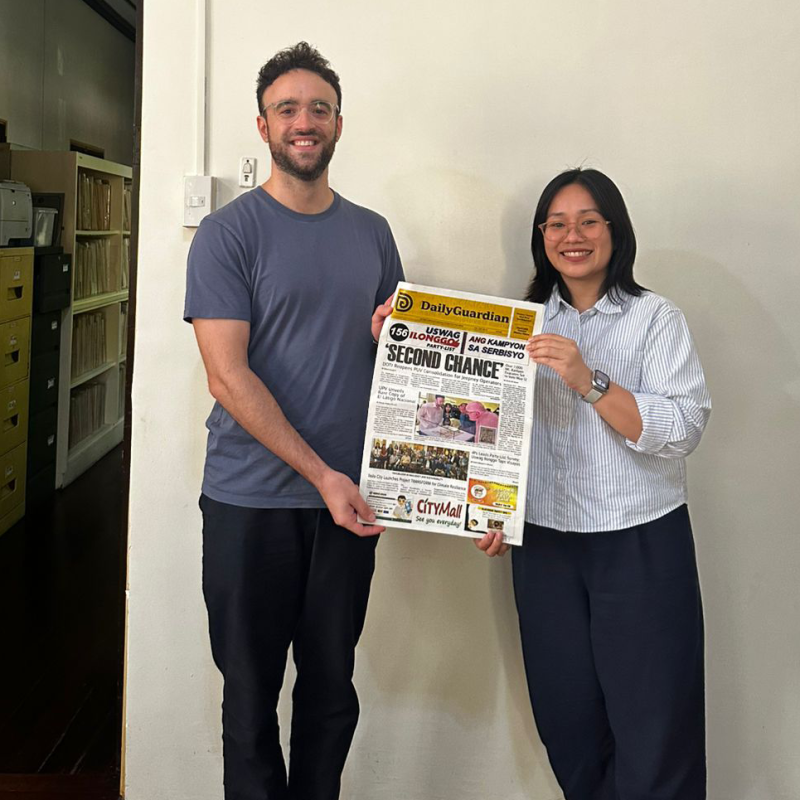Flea Market Discovery by Spanish Ph.D. Student Sparks International Repatriation Project

As University of Virginia graduate student Robert Sanchis-Álvarez can attest, there is no telling where the needle-in-a-haystack search for archival documents will lead.
The Ph.D. candidate in the College and Graduate School of Arts & Sciences’ Department of Spanish, Italian and Portuguese was conducting research in his native Barcelona in 2023 when a flea market trip led to the type of discovery historians and research scholars dream of. Within the teetering piles of old magazines, books and posters, Sanchis-Álvarez discovered a rare 19th-century newspaper edited by Graciano Lopez Jaena, an early hero of the Philippine independence movement.
Working on a dissertation project examining how Spanish colonialism in the 19th century shaped how people interacted with and shaped urban and living spaces in the Philippines, Sanchis-Álvarez had just read a biography of López Jaena that mentions El Látigo Nacional as one of his final editorial projects in Spain. That helped Sanchis-Álvarez recognize the historical value of this discovery — as well as the importance of preserving and sharing a revolutionary newspaper long presumed lost.
What followed was nearly two years of international collaboration between the University of Virginia and institutions in Spain and the Philippines, led by Sanchis-Álvarez, to preserve the 1893 issue of El Latigo Nacional. It is believed to be one of only two surviving copies of the newspaper, published from 1893 to 1894. The newspaper served as “an act of resistance,” Sanchis-Álvarez said, at a time when Lopez Jaena was active in the republicanism movement in Spain as well as democratic reform efforts there and in Spain’s colonial holdings in the Philippines.
Connecting with a conservation team at the University of Barcelona and the special connections unit of Ateneo de Manila University in the Philippines, Sanchis-Álvarez worked to digitize and stabilize the fragile 132-year-old newspaper before its unveiling to the public in May at an archival repatriation ceremony at the Center for West Visayan Studies at the University of the Philippines Visayas — a central partner in the project.
“We didn’t want this to be a one-time ceremonial gesture in the Philippines,” said Sanchis-Álvarez, who is planning a series of student-centered workshops on historical memory and archival engagement at UVA this fall based on the newspaper’s discovery and the efforts to preserve it. “The meaning of the newspaper emerged collectively from its return as well as through the care, scholarship and cultural memory work already alive within the Center for West Visayan Studies and its community.”

The unveiling coincided with a symposium on Lopez Jaena’s legacy and the importance of “recovering voices in the archives” co-organized with the Center over months of collaboration, from October 2024 to May 2025, during Sanchis-Álvarez’s doctoral research stay in the Philippines. Sanchis-Álvarez credits the Center for West Visayan Studies and its director, Frances Anthea R. Redison, with helping to manage every stage of the return of the newspaper.
“What happened on May 7 with the repatriation ceremony and the symposium was the culmination of months of preparation and partnership with the Center, grounded in mutual trust and sustained international and local collaboration,” Sanchis-Álvarez said. “This project speaks to the enduring ties between Spain and the Philippines, while opening up a critical reflection on how colonial legacies continue to shape access to memory and cultural heritage today.”
The May symposium featured local scholars, descendants of Lopez Jaena, a Commissioner from the National Historical Commission of the Philippines, and Sanchis-Álvarez’s dissertation advisor, UVA Spanish professor Ricardo Padrón, who traveled to the Philippines to participate as a featured guest speaker.
“I've been teaching and doing research at UVA for 29 years, and I've never seen anything like this,” Padrón said of Sanchis-Álvarez’s find. “We've never had a case where a graduate student has discovered an important primary document and has done the kind of work that Robert has done to get it into the hands of the people who really should have it. I've never made a discovery like this. We're all very proud of him and very excited about what's happened.”
Christa Acampora, Buckner W. Clay Professor of Philosophy and dean of Arts & Sciences, said Sanchis-Álvarez’s discovery and his collaborative work in Spain and the Philippines spotlights the best attributes of graduate students’ contributions to UVA’s research mission.
“Robert Sanchis-Alvarez exemplifies the intellectual rigor, creativity, and scholarly dedication that define our graduate students in Arts & Sciences,” Acampora said. “Graduate students like Robert are essential to our University, strengthening our community by bringing fresh perspectives, driving innovation, and mentoring and inspiring undergraduates. They contribute meaningfully to the advancement of knowledge across disciplines, and we are proud to support and celebrate their achievements.”
Sanchis-Álvarez’s project has evolved into a broader academic partnership that includes a memorandum of understanding to support future archival academic collaboration between the University of the Philippines and UVA. It’s a particularly timely step, Padrón said, given the launch by UVA’s College and Graduate School of Arts & Sciences of its new Global Spanish initiative.
“It's a way of reconfiguring the study of Spanish across Arts and Sciences, so that it's not limited to the Spanish department, and it's not limited to Spain and Latin America. You have, for example, this 400-year history of the Philippines as a Spanish colony, and this is very much a part of that story,” Padrón said. “It just so happened that Robert was working on the Philippines and made this discovery around the same time UVA has set up a framework that is particularly receptive to collaborations with institutions like the University of the Philippines Visayas who wouldn't necessarily have been on our radar before.
“It’s very much an example of the kind of relationship that the Global Spanish initiative wants to create between UVA and partner institutions.”








